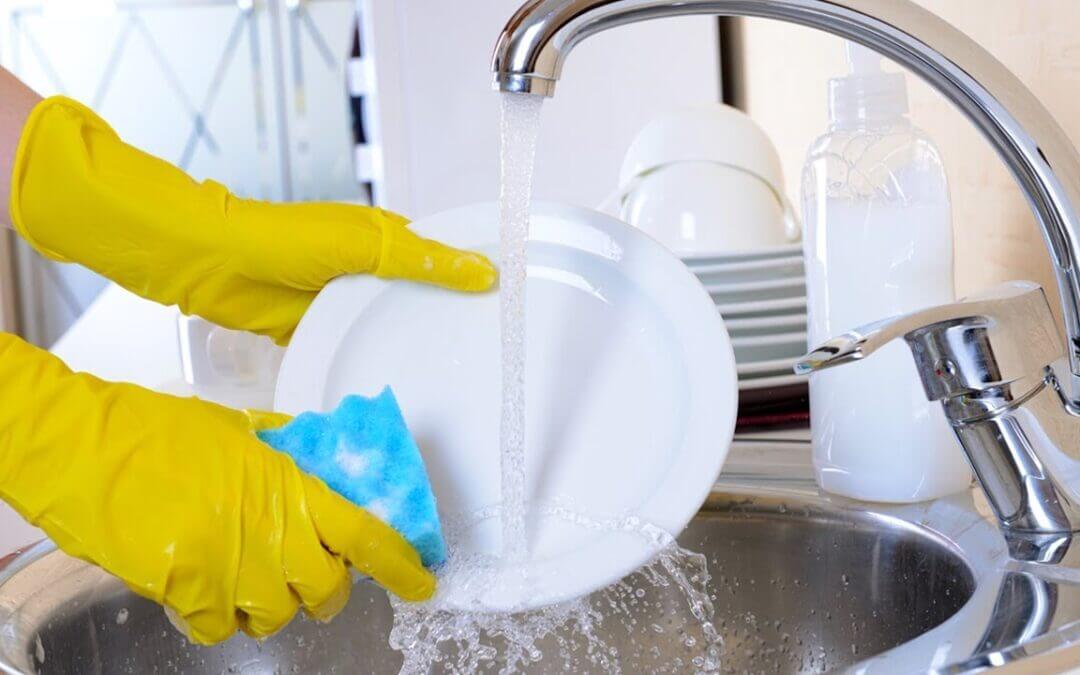How to Properly Wash Dishes by Hand

Dishwashers are a lovely luxury to have, but don’t you think they make you a little lazy? Furthermore, because not everything fits in a dishwasher, you must hand-wash larger dishes. There’s also the odd technical issue where the dishwasher breaks down or doesn’t work properly.
As a result, knowing how to clean dishes without the assistance of a machine (or others) is essential. As simple as doing dishes may seem, it is important to know how to do it correctly in the least amount of time and energy.
In this article, you will learn how to wash dishes properly by hand without a dishwasher. Let’s get started.
Prepare the Sink
Remove any soiled dishes and set them next to the sink. Now, using an old sponge and a little liquid soap, thoroughly clean the sink. Once your sink is clean, replace the stopper.
Fill the sink with enough water to immerse your dirty dishes, and add roughly two teaspoons of liquid soap. For more filthy utensils, use warm or gently hot water. This task may seem challenging. In that case, just contact HomePlus house cleaning service in Billerica, MA, if you live there. Our cleaners will quickly clean all your dishes.
Soak All Dishes
Dish tubs are little plastic containers that fit in your sink. If you do not have a dish tub, just close your sink and fill it with water and soap, but a dish tub is the finest way to wash dishes. To soak your dirty dishes, turn on the hot water faucet and allow it to run until quite hot.
Fill the dish tub with a couple of squirts of a natural, chemical-free detergent. Then fill it halfway with boiling water. In the water, swish the detergent around. After that, add your dirty dishes and soak them for a few minutes. Soaking them makes it easier to remove difficult stains off plates, pots and pans, and glasses.
Wash The Dishes
Start by washing the objects that are the least dirty first. Glasses, cups, and flatware are typically included. Before washing plates, bowls, and serving utensils, wash these things. The basic rule is that dishes wash up readily if you scrub them while keeping them submerged in water; while you work, remove each dish from the water to look for missed places.
Finish with cookware/pots and pans; soaking pans with baked-on items will make washing simpler. Clean kitchen knives with extreme caution! Instead of piling them in the sink, clean them one at a time and quickly set them handle-up in the rack to dry.
Dry the Dishes
It’s time to dry the dishes after they’ve been cleaned and rinsed. Gently blot each dish dry with a clean, dry towel, making sure to eliminate any leftover water droplets. To avoid scratching fragile surfaces, stop using a harsh or abrasive towel; only use a microfiber cloth.
Put each dish in a dish rack to air dry if you have one. Turn dishes upside down to allow any residual water to fall off and vaporizes. If you do not have a drying rack, you can set the dishes on a clean towel or a drying mat.
The Benefits of Hand Washing Dishes
Hand-washing dishes can be a more eco-friendly and cost-effective option than using a dishwasher. By washing dishes by hand, you may save water and lower your carbon footprint while also having more control over the cleaning process. Delicate things can be handled more softly, while stronger stains can be cleaned more vigorously.
Furthermore, many individuals think that hand-washing dishes is soothing and peaceful, making it an excellent way to relax and decompress. Training youngsters to hand-wash dishes may inculcate vital life skills and responsibilities.
Hand washing dishes with the correct equipment and procedures may maintain cleanliness and hygiene while also decreasing environmental effects. Ultimately, hand-washing dishes may be a gratifying and healthy exercise for both the individual and the environment.
Top Tips for Efficient Hand Washing
Hand-washing dishes efficiently and effectively requires a few techniques and tactics. To begin, soaking excessively filthy dishes in hot soapy water before washing aids in the removal of grime. Next, a long-handled dish brush is useful for cleaning hard-to-reach spots.
Finally, to avoid cross-contamination, use a different sponge or brush for each type of dish. And also, washing dishes in order of solidness inhibits the spread of bacteria and guarantees that each dish is thoroughly cleansed. Finally, it is critical to change the water often to maintain it clean and hot for thorough cleaning.
Hire the Cleaning Service
Keeping your dishes clean is an important task. You can clean your dishes yourself, but if you lack time or energy, hire HomePlus house cleaning services in Billerica, MA. Our cleaners have excellent cleaning skills and supplies.
Request a quote by clicking through our quote form.
